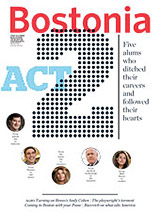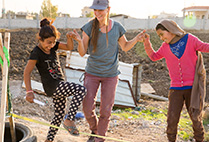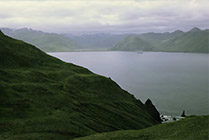Appreciation for Mitchell Garabedian (CGS’71, CAS’73)…
Lara Ehrlich’s thoughtful article about Mitchell Garabedian’s battle with the Catholic Church on behalf of all those hurt by the priests was much appreciated (“Mitchell Garabedian vs. the Catholic Church,” Fall 2017).
However, I feel that Mitch needs a little more fleshing out about his past. In particular, you should know about his two years at the College of Basic Studies, as CGS was known in the 1970s. CBS then (and now, I think) used a team-teaching approach, which kept us together as a class as we progressed in our studies. Mitchell loved puns and was constantly pulling them out of every presentation and conversation, such that we all began to urge him to please stop(!).
Our second year together, every time a good opportunity for a delightful pun raised its head, we all looked to Mitch. But, strangely, he never rose to the bait, simply saying, “No, I don’t do that anymore.” This, despite our clearly inadequate efforts to fill the void.
Months went by and the last day of class came in May 1971. We were all sharing coffee and cookies (a CBS freebie most of us counted on for a balanced meal) and just lounging about, getting ready to say goodbye to all and move on with our lives.
Then, for some odd reason a truly great pun opportunity arose. Mitch suddenly came to his feet and proceeded to spew out every possible pun imaginable. He commented on the subject at hand and then expanded to cover all of us who were listening, yet managed to expand again into the realm of the University, then to the state of Massachusetts, slid into the town of Methuen, and then out again to our collective futures.
It was a tour de force which I have remembered to this day.
Thanks, Mitch.
John Shirley (CGS’71)
West Newton, Mass.
Thanks to Lara Ehrlich and Bostonia for the great piece on Mitchell Garabedian, one of my heroes. Each time I read about him and Boston Globe Spotlight reporter Michael Rezendes (CAS’78), I weep and then rage. I read the piece as soon as I got it from my mailbox.
Jo Sullivan (GRS’72,’78)
Lynn, Mass.
…And for Bostonia
Every month my household receives two copies of Bostonia, one each for my wife and sister—Snezna Rogelj (GRS’85) and Jyotsna Dhawan (GRS’91). I’m the one who reads it, despite being an alumnus of MIT across the river. I am moved—often to tears—by the content and quality of the stories and endeavors of the faculty and alumni chronicled. I get Technology Review as well, but it is Bostonia that touches me more profoundly on the human aspects of the intellectual life. I repeatedly resolve to write, and I have finally done so. Thank you, and keep going strong.
Vivek Dhawan
Socorro, N.M.
Honoring Poe
Thanks for Bostonia’s article on the film by Eric Stange (COM’79) presenting a “fuller picture” of Edgar Allan Poe (“PBS Documentary Brings Edgar Allan Poe to Light,” Fall 2017). Such was also the purpose of my late classmate Norman S. George (COM’72), whose deep and thorough reading of Poe’s works led to his impersonating the writer in lamp-lit theatrical productions and even a program on the A&E network. Graduates of a certain vintage may remember Norman’s acerbic “By George” humor column in the Daily Free Press and his tongue-twisting Gilbert & Sullivan patter performances with the BU Savoyards.
Edward F. Maroney (COM’72)
Hyannis, Mass.
P.S. Hear Norman’s reading of “The Raven” on YouTube.
King of the Castle
它
Greece and the Refugee Crisis
The refugee crisis may seem far away for many, but questions remain (“Hope and a Cell Phone,” Fall 2017). Why are countries that are already going through their own crises—particularly poor countries like Greece, clearly a small country of a little over 10 million—literally having the West turn its back on them, barricading land borders, and even sending migrants back to Greece, since the Dublin Treaty calls for the country that first receives migrants to have main responsibility? Furthermore, why have hardly any refugees gone to Saudi Arabia, a wealthy Muslim country that has built housing for refugees?
Despite all this, Greece has managed to keep at least approximately 60,000 refugees while another very large number—perhaps over 20,000—are still undocumented. Your article mentions nothing of Greece or Italy, which are picking up people intentionally left to drown by some neighboring countries mentioned in your article, including Turkey, which smuggle people illegally on makeshift or float boats after refugees pay very large sums of money for a better life in Europe. Worse, they are pushed out to sea and lifeboats are intentionally destroyed (Turkey and some Northern African countries are notorious for this). There are many independent films documenting this, one called 4.1 Miles by Daphne Matziaraki.
Many of the Greek islands are literally sinking with the inability to manage the flood of refugees for years, despite the Greek tradition of welcoming strangers and helping fellow people called “philanthropia”(φιλανθρωπία). Yes, Lebanon should be commended for its assistance. But let’s speak truth.
Another question is why your article mentions a grandmother “near the border of Macedonia,” when we know the entire area, including the southern part, is and has always been since ancient times a Greek (Hellenic) Macedonia region and the neighboring country is recognized in EU as F.Y.R.O.M. “Former Yugoslav Republic of Macedonia.” Please do not minimize the help from many Greek people in all parts of the country, and do not take away the history of an entire country.
Lastly, as I was taught in public health, let’s not only look at those floating down the river; let’s find out why and do something about the root of the problems. ISIS was originally funded by the Bush administration and as we know now is out of control. We also need to talk about birth control in all overpopulated countries, seeing that we are no longer farming cultures, opening discussion from all sides about assimilation, not just building “ghettos.” Let’s not have major countries, including most western EU countries, simply dismissing “not my problem.” It IS a world globalization problem.
Barbara Kondilis (SSW’98, SPH’99)
Glyfada, Greece













































Related Stories
$2.5 Million Gift Creates Maria Stata Professorship
Endowment focuses on classical Greek studies
BU Garners 16 CASE Awards
Earns more honors for creative work than any other school worldwide
Greece’s Misery: “A Fraternity in Which Everyone Gets Hazed”
BU’s Vivien Schmidt questions the latest bailout deal
Post Your Comment